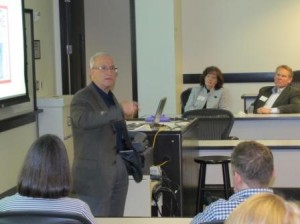Is entrepreneurship for you?
By Sara Jones, TMMBA Assistant Director & Class of 2012 Candidate
We recently had a networking night for students and alumni of the TMMBA and Executive MBA programs. Our speaker for the evening was Jeff Levy, an entrepreneur, coach, and mentor who has helped hundreds of individuals open their own franchise or small business. He’s also the co-author of Making the Jump into Small Business Ownernship (read an excerpt in this GeekWire post).
Jeff shared his entrepreneurial journey and views on what it takes to achieve small business ownership. He highlighted his personal challenges and achievements and the who, what, when, where, and why of entrepreneurship. We followed-up with Jeff after the event with a few questions. Here’s what he had to say:
What is your proudest moment as an entrepreneur?
There have been many times in my career where I felt pride and a sense of accomplishment. These usually came after achieving something that no one thought possible. Probably, the most significant moment was when my partners and I put together a $35million package to buy the three division from Flow International to form Safeworks, LLC. No one, including ourselves, during the process, knew how it would exactly come together. We never gave up on our dream and made it happen.
It’s not easy to take a leap from being employed (and the primary earner) to being an entrepreneur. When is the right time to start my own business? Is there a strategy that would provide the least impact to my family?
You are very right that it is not easy to leave the comfort of a regular paycheck. However, workers today function in what is called the “new career economy.” A paycheck is not necessarily a synonym for security. At the executive level it is not uncommon to be in a different job, or in career transition every 3-4 years. What you want to avoid is having to start a business when not working as a result of a layoff. That is a lot of pressure unless you have a good severance and possibly Self Employed Assistance Plan benefits provided by the State of Washington. I think the best strategy is to work on the planning part of your business while you have the comfort of the regular check. Give particular thought to the capital side of the business. Do you have enough money set aside to meet your living expenses for up to a year (or more) in addition to the capital requirements for investing in the business. Once funding is secure it still takes the difficult task of balancing your dreams versus your fears. My family has always been supportive of my entrepreneurial pursuits. They believed that my early career success working for others would be transferable to my own venture. As my wife said. In her wisdom, you have made money for others, it is time that you do it for yourself.
With the dramatic changes in technology and impending talent war, what are the pros and cons of being a full-time employee versus self-employed?
I think that there will be a talent war. It actually exists today for certain software engineers and programmers. I do believe the jobs of the future will be “newer and fewer”. No matter what the demand may be for talent in a salaried environment, I don’t think it competes with the benefits of being your own boss. Clearly, I have a bias in this regard. Workers tend to get comfortable living at the level of their W-2 income and don’t do enough to create real wealth or to control the most valuable thing they have, their time. I also believe that technology will create many more opportunities for self-employment.
What is the number one personality trait you see in successful entrepreneurs?
I think the # one personality trait is optimism. The ability to look for the opportunity no matter what the difficulty or the challenge may be. There are certainly other very important traits but you asked for one. If you are a pessimist trying to go into business, game over!
What is the single biggest obstacle encountered by aspiring entrepreneurs?
Here I need the latitude to give a few obstacles. You might think it is the lack of capital, but I don’t believe that is what holds entrepreneurs back although it might delay entry or slow down the ramping up of the business. My story is a good example of working the plan until you make it happen. Raising $35m looked like climbing Mt. Everest. The two biggest obstacles are being close minded and not having developed mastery of basic business management skills.

